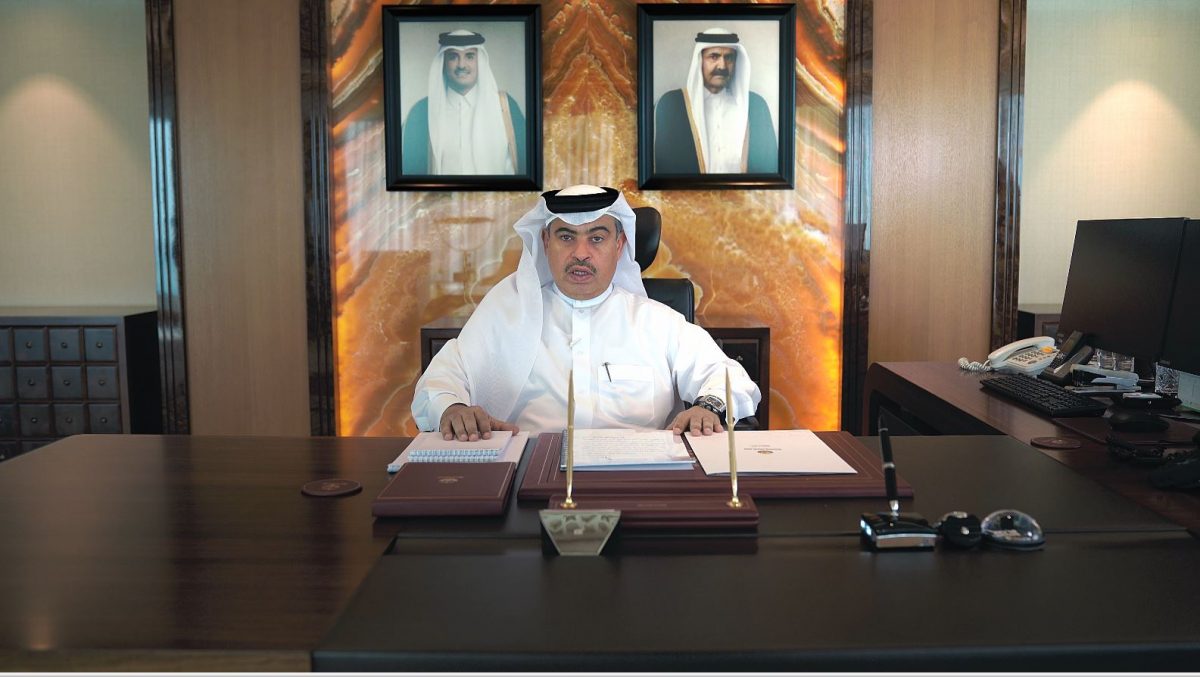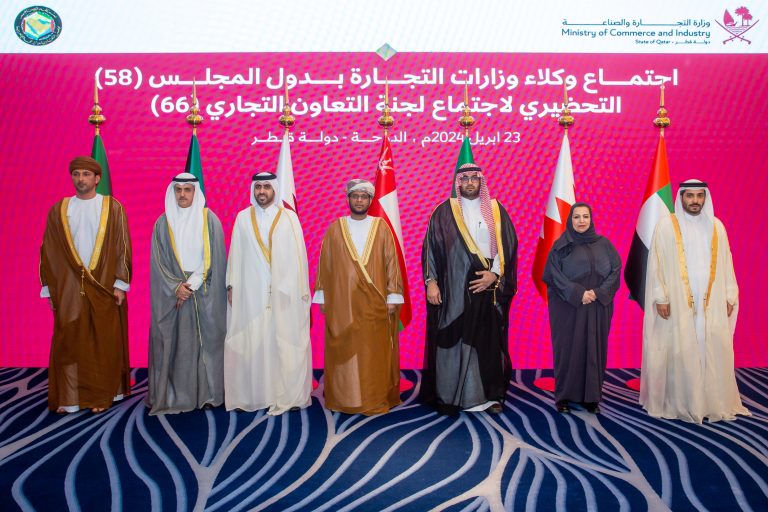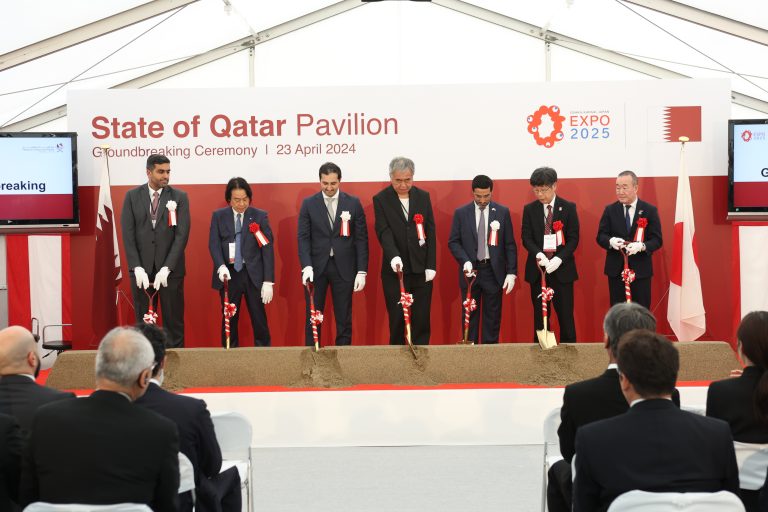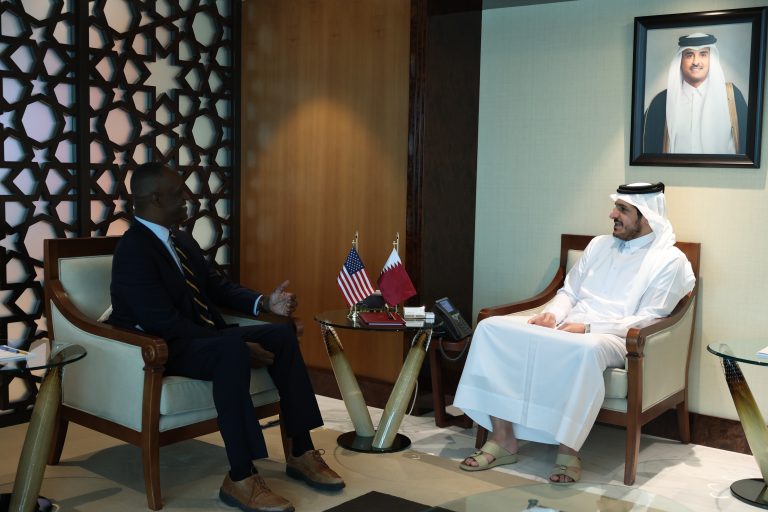
During his speech at the opening session, H.E. the Minister of Commerce and Industry said:
“Islamic banks represent an important pillar for the stability of Qatar’s financial sector.”
- Qatari Islamic banks are ranked among the largest Islamic banks worldwide.
- The volume of assets of local Islamic banks amounted to 415.8 billion Qatari Riyals at the end of 2019, compared to about 350 billion Riyals in 2018.
- The revenues from financing and investment activities represented 90% of the total revenues of Qatari Islamic banks.
- The COVID-19 pandemic has offered new, wider horizons in terms of benefiting from digital technology.
- Qatar has been keen as part of its strategy to establish an advanced and integrated infrastructure for digital technology across all its sectors, including the financial division.
Doha – Tuesday, March 30, 2021:
Under the patronage of His Excellency, Sheikh Khalid bin Khalifa bin Abdulaziz Al Thani, Prime Minister and Minister of Interior, H.E. Mr. Ali bin Ahmed Al Kuwari, Minister of Commerce and Industry, inaugurated the proceedings of the seventh Doha Islamic Finance Conference, themed ‘Digital Economy and Sustainable Development’, organized by Bait Al Mashura Finance Consultations Company from March 30 until April 1, 2021, through video conferencing.
In his opening speech, H.E. the Minister of Commerce and Industry expressed thanks and appreciation to H.E. Sheikh Khalid bin Khalifa bin Abdulaziz Al Thani, Prime Minister and Minister of Interior for his generous sponsorship of the conference.
H.E. Mr. Al Kuwari stressed the importance of the conference, as its current edition sheds light on the prospects for sustainable economic growth in light of the major transformations that the world is witnessing, following the outbreak of the COVID-19 virus. The current circumstances require every country to work as a single international community to address common challenges in all areas, especially the economic one, H.E. indicated.
H.E. Mr. Al Kuwari further stated that meeting represented an opportunity to point to the Islamic economic sector, which is one of the most important solutions to the current challenges, considering that it is a safe haven for sustainable development, and a robust bulwark against financial crises. An Islamic financial system, based on the principles of Sharia law and the prudent concepts therein, can achieve the interests of individuals and the society through its pivotal role in building an equitable, comprehensive economic system, devising effective solutions to urgent economic issues, and achieving the desired development, H.E. explained.
Additionally, H.E. said that Qatari Islamic banks currently ranked among the largest Islamic banks in the world. Qatar is one of the largest markets for Islamic finance in the world, H.E. noted, as the volume of assets of local Islamic banks amounted to 415.8 billion Qatari Riyals at the end of 2019, compared to about 350 billion Qatari Riyals in 2018.
H.E. further added that Qatari Islamic banks showed a strong performance and high growth rates in their profits in 2019, indicating that their revenues reached 18.6 billion Qatari Riyals, an increase of 15.4% compared to 2018. The revenues of financing and investment activities accounted for 90% of the Islamic banks’ total revenues.
H.E. Mr. Al Kuwari attributed this remarkable growth to the pioneering legislative and regulatory environment of Qatar’s Islamic finance sector, especially in light of its keenness to developing this important division, so as to help finance areas that support the national economy. Funding from Islamic banks to the real estate sector amounted to 36.4% of the total funding it received from the banking sector, and 35.6% in the industrial division.
H.E. pointed out that in view of the entities financed by Islamic banks, the private sector has greatly benefited from these banks’ credit, especially in the field of real estate, trade, financial activities, and insurance, as well as the small and medium-sized companies division. In this regard, Islamic banks today represent one of the pillars of the stability of Qatar’s financial sector, H.E. affirmed.
About the digital economy, H.E. Mr. Al Kuwari said that the COVID-19 pandemic had delayed implementing development plans in all countries worldwide, without exception. However, it opened large and wide horizons to benefit from digital technology and adopt new perspectives that support countries’ economies in an innovative, comprehensive and sustainable way. Qatar has been working for several years to adopt technical, technological and digital solutions in building its economic and financial system, and developing its programs and projects aimed at achieving its National Vision 2030.
Furthermore, H.E. Mr. Al Kuwari added that the State was keen, as part of its strategy, to establish an advanced and integrated infrastructure for digital technology across all its sectors, including the financial one. H.E. pointed in this regard to the Qatar FinTech Hub (QFTH) launched by the Qatar Central Bank, in cooperation with the Qatar Financial Center and the Qatar Development Bank. The QFTH has offered programs aimed at supporting entrepreneurs, and promoting innovation and development in the field of financial technology.
On initiatives aimed at consolidating Qatar’s position as an ideal investment destination at the regional and global levels, H.E. spoke of the Single Window Platform launched by the Ministry of Commerce and Industry. This aims at assisting investors in the various stages of establishing companies, starting from the planning to registration procedures, and all the way to obtaining the necessary licenses through an electronic interface that connects investors, at any time and where ever they are, with about 18 government agencies via a single platform.
H.E. Mr. Al Kuwari also referred to the draft decision to establish the Artificial Intelligence Committee in Qatar. This decision was recently proposed by the Cabinet, such that the committee’s membership represents the Ministry of Commerce and Industry, government agencies, research institutions and universities. The Artificial Intelligence Committee shall handle developing mechanisms to follow up and implement Qatar’s artificial intelligence strategy, oversee programs and initiatives related to this field, as well as support emerging companies specializing in artificial intelligence and scientific research.
In the conclusion of his speech, H.E. the Minister of Commerce and Industry affirmed that the expanding endeavor of Islamic finance in Qatar, and the continuous efforts to develop it required vigorous and innovative steps to preserve attained achievements in light of global changes, as well as to keep abreast of the tremendous developments the world is witnessing at the level of digital technology.
The seventh Doha Islamic Finance Conference tackled three main subjects, featuring interventions by a group of scholars and experts in the field of Islamic economics and finance. The first subject dealt with the features of economic recovery in the post-COVID-19 stage, and ways to benefit from the capabilities of Islamic finance during it, through Islamic finance institutions and products. The second topic touched on the economies of the virtual world and the most important legal and Sharia controls governing dealings therein, in addition to exploring the future prospects of this important sector. The third area addressed social finance and its role in achieving sustainable development.
The works of the seventh edition of the conference also witnessed international participation from governmental bodies, global organizations, as well as financial and academic institutions specializing in the field of economics, digital technology and Islamic finance.








